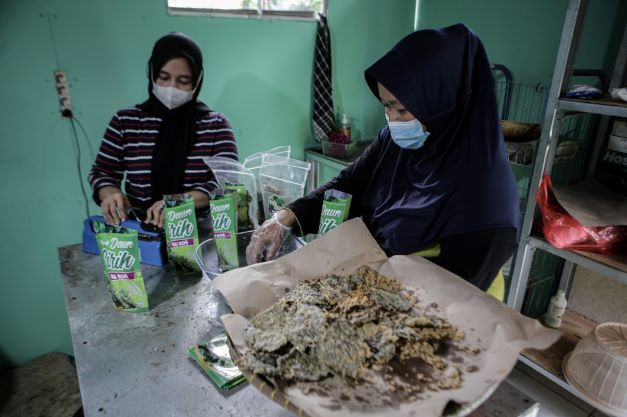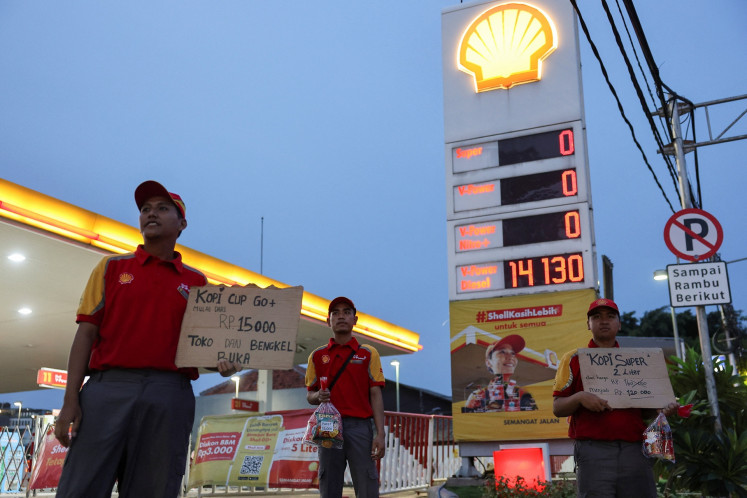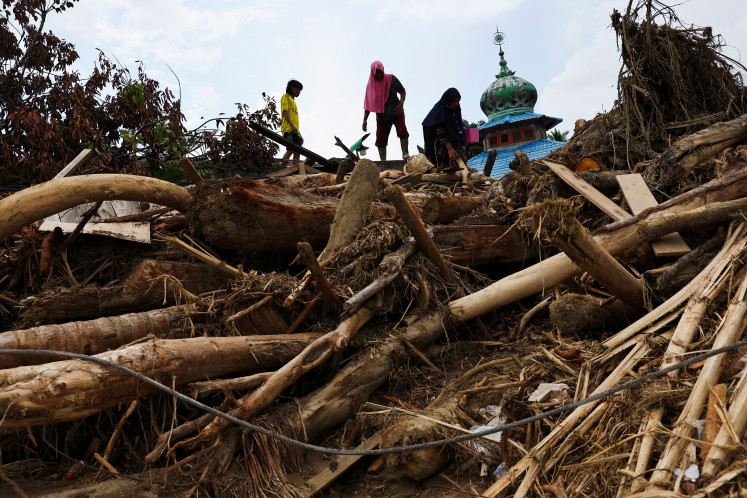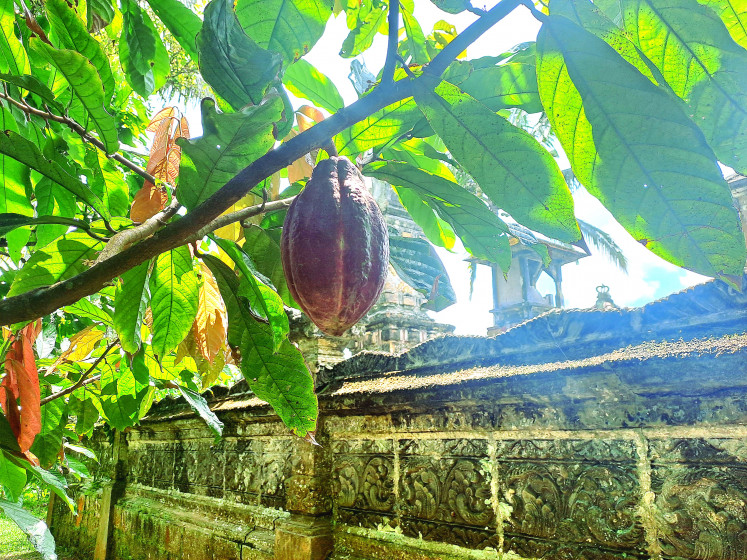Popular Reads
Top Results
Can't find what you're looking for?
View all search resultsPopular Reads
Top Results
Can't find what you're looking for?
View all search resultsEmpowering Indonesian women entrepreneurs for a stronger society
Notably, women-owned MSMEs constitute a significant portion of this landscape, comprising 64.5 percent of total MSMEs, surpassing global averages where only one in three MSMEs are women-owned.
Change text size
Gift Premium Articles
to Anyone
S
outheast Asia's dynamic entrepreneurship landscape is witnessing a significant shift as women entrepreneurs, spurred by evolving trends, spearhead business and trade ventures across the region. Indonesia, Southeast Asia's largest economy, is a critical market driving this change.
As the world's fourth most populous country that is home to 275 million people, Indonesia has a vibrant community of entrepreneurs. With over 65 million micro, small and medium enterprise (MSME) entities contributing to 60 percent of the national gross domestic product (GDP), amounting to Rp 9.6 trillion (US$603 million), Indonesia's entrepreneurial sector plays a pivotal role in its economic framework. Notably, women-owned MSMEs constitute a significant portion of this landscape, comprising 64.5 percent of total MSMEs, surpassing global averages where only one in three MSMEs are women-owned. In developing and lower-income nations, where wage work is not ubiquitous, entrepreneurship emerges as a vital avenue for financial empowerment.
Through a collaborative effort between Boston Consulting Group (BCG) and Stellar Women, a dedicated community platform supporting and connecting empowered women in Indonesia, over 500 women entrepreneurs were surveyed to capture the realities they face while navigating the entrepreneurship landscape.
Unveiling the landscape of women-owned MSMEs in Indonesia
Our survey revealed that 83 percent of women entrepreneurs operate their businesses primarily in Java's prominent provinces, including the Special Capital Region (DKI) of Jakarta, and West Java, with an average age of 34. This concentration aligns with Java Island's status as the economic hub, contributing 56 percent to the country's GDP.
These entrepreneurs mostly began their business journeys at 30, often being single or married with no children at the outset, possibly indicating fewer family-related burdens hindering initial business development. 70 percent of the surveyed women hold at least a bachelor's degree, emphasizing the importance of education. Yet, only 24 percent succeeded with their businesses on the first attempt, highlighting the transformative role of experience alongside education.
The survey also reveals minimal differences in motivation for running a business, with earning an income and pursuing a passion being the top motivators across both groups, indicating common aspirations among Indonesian women entrepreneurs.
The food and beverage (F&B) sector stands out as the most widely operated business type among these female entrepreneurs, constituting 48 percent of the sample, reflecting a preference for industries offering end-to-end management opportunities. Despite the prevalence of F&B businesses, the majority generate less than Rp 10 million (US$628.77) in monthly revenue.
Additionally, about 75 percent of these women-owned and managed enterprises (WSMEs) operate with a compact workforce of zero to four individuals. Notably, 55 percent of WSMEs employ more women than men, creating a virtuous cycle and further empowering women in employment.
Unraveling the unique challenges that impact women-owned MSMEs
Although WSMEs account for a significant majority (64.5 percent) of MSMEs in Indonesia, they face multifaceted challenges that can hinder their active participation in business ownership. These challenges encompass various aspects, including resource acquisition and bridging digital literacy gaps.
However, there are deeper, systemic issues, such as societal expectations and biases, that also need to be addressed across the socioeconomic spectrum to create a truly inclusive business environment.
Our survey identified 13 distinct challenges that women entrepreneurs face. [Exhibit 1.]
[gal:1]
These 13 major challenges faced by WSMEs can be broadly categorized into four core themes:
- Networking: In a G20 survey of nine companies across the globe, mentoring and networking were considered the top two best practices to advance women to leadership positions. Despite the value of such structured environments, women-led MSMEs often lack formal platforms for connecting with fellow entrepreneurs. This reality is reflected in our survey—more than half of the WSMEs surveyed highlighted the difficulty in accessing mentors and support communities, particularly pronounced for women based outside of Jakarta.
- Financing and infrastructure: Securing resources, particularly financing, and navigating unclear regulations pose a significant challenge for the women entrepreneurs surveyed (70 percent). Hence, a majority of these women resort to conventional sources like personal savings to finance their businesses. However, obtaining more sophisticated funding sources like venture capital remains challenging.
- Skills: In our survey, 66 percent of the women surveyed believe they lack the knowledge required to run a business. Our interviews with women entrepreneurs reveal their enthusiasm for upskilling to enhance their business acumen, particularly in digital proficiency and platform utilization. Indonesia's tech-savvy population, with 77 percent internet penetration and 60.4 percent social media penetration, is evident in our survey findings. A notable 86 percent of WSMEs are already leveraging digital platforms to drive business growth. For the minority not yet utilizing digital platforms, there is a willingness, but a knowledge gap in selecting and operating the right platform poses a challenge. Among the 86 percent already using digital tools, social media and e-commerce platforms are predominant choices, with 96 percent and 67 percent of women, respectively, incorporating these platforms into their businesses.
- Family: Women in leadership roles confront distinct social and cultural expectations compared to their male counterparts, creating additional challenges unique to women. These expectations require women to strike a delicate balance between authority and amiability, advocacy for themselves while caring for others and being assertive yet empathetic. In our survey, more than half of the women mentioned the difficulty in balancing domestic and entrepreneurial roles.
Legacy and emerging enablers are critical for women entrepreneurs’ success
Empowering women entrepreneurs in Indonesia is crucial not just for gender equality but also for driving economic growth and innovation. With over 64.5 percent of MSMEs in Indonesia owned or managed by women, they hold a substantial presence in the entrepreneurial landscape.
Acknowledging the multifaceted challenges women entrepreneurs encounter necessitates establishing comprehensive support mechanisms to facilitate their growth and prosperity. Government intervention, the private sector and self-support all play pivotal roles in fostering an environment conducive to the success of WSMEs.
Government intervention: Prioritizing financial support as a cornerstone of economic empowerment is critical to stimulate WSME growth. Establishing a clear and consistent definition of women in MSMEs is imperative, encompassing the classification of MSMEs and implementing transparent methods to distinguish between male- and female-driven businesses, with gender-specific reporting crucial for key national metrics.
Developing support programs with defined objectives and guidelines tailored to WSMEs' specific needs is essential, including training, workshops and mentoring aligned with government objectives. Policies incentivizing private sector support for WSMEs must be enacted, recognizing their potential and fostering an ecosystem that uplifts and nurtures WSMEs.
Additionally, governments should prioritize monitoring and reporting progress, ensuring that initiatives translate into tangible outcomes, enabling adjustments, improvements and targeted interventions to further empower women entrepreneurs while maintaining transparency and accountability in supporting WSMEs.
Private sector: The private sector's role in nurturing WSMEs is exemplified through dedicated programs providing women entrepreneurs with holistic support, ranging from education and mentorship to access to capital and networking opportunities.
Self-support: Internal drive, determination and self-confidence serve as the foundation for success, complementing external resources and mentorship. Networking and building a robust support system is key, with organizations like Stellar Women and BCG providing mentorship programs and networking opportunities.
Not only does establishing a concrete support system impact women entrepreneurs and Indonesia’s economy, but it also has a global influence, emphasizing the paramount importance of women in MSMEs and the broader agenda of gender equality and empowerment.
***
Lenita Tobing is managing director and partner at Boston Consulting Group. Samira Shihab is a cofounder of Stellar Women.











